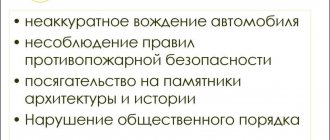1. The following administrative penalties may be established and applied for the commission of administrative offenses:
1) warning;
2) administrative fine;
3) has become invalid. — Federal Law of December 28, 2010 N 398-FZ;
4) confiscation of the instrument or subject of the administrative offense;
5) deprivation of a special right granted to an individual;
6) administrative arrest;
7) administrative expulsion from the Russian Federation of a foreign citizen or stateless person;
 disqualification;
disqualification;
9) administrative suspension of activities;
10) compulsory work;
11) administrative ban on visiting the venues of official sports competitions on the days they are held.
2. Administrative penalties listed in paragraphs 1 - 4, 9 of part 1 of this article may be applied to a legal entity.
3. Administrative penalties listed in paragraphs 3 - 11 of part 1 of this article are established only by this Code.
- Article 3.1. Purposes of administrative punishment
- Article 3.3. Basic and additional administrative penalties
The concept of administrative punishment and the conditions for its imposition
Administrative punishment is a measure of responsibility established by the state for committing an administrative offense; is used to prevent the commission of new offenses both by the offender himself and by other persons.
Based on this definition, administrative punishment may be imposed if the following conditions :
- the measure of liability is established exclusively by the state (the Code of Administrative Offenses of the Russian Federation provides for the possibility of establishing a measure of administrative liability both at the federal and regional levels (by the subjects of the Russian Federation in regional laws), but within the framework established by federal legislation);
- assigned only for committing an administrative offense. Listed in Part 1 of Art. 3.2 of the Code of Administrative Offenses of the Russian Federation, administrative penalties are applied only to persons who have committed administrative offenses. The commission of other offenses and misdemeanors (crimes; civil offenses; disciplinary offenses; tax offenses entailing the application of tax sanctions) cannot lead to the imposition of administrative punishment.
- the imposition of an administrative penalty should be aimed at preventing the commission of new offenses both by the offender himself and by other persons;
- Administrative punishment cannot be aimed at humiliating the human dignity of an individual who has committed an administrative offense, or causing him physical suffering, as well as harming the business reputation of a legal entity.
What is a tax offense and responsibility for it?
Tax offenses are actions that violate the provisions of the Tax Code and for which liability is established (Article 106 of the Tax Code of the Russian Federation).
For committing an illegal act, the law provides for fines and sometimes criminal penalties. The punishment depends on the type of violation and the presence of intent. According to the Tax Code of the Russian Federation, it is impossible to fine a company official - the fine is imposed on legal entities and individuals. But this does not mean that the general director and chief accountant are free to do whatever they want. Along with fines for an organization under the Tax Code of the Russian Federation, articles of the Code of Administrative Offenses or even the Criminal Code of the Russian Federation may be applied to officials.
Individuals bear tax liability from the age of 16. Even if a child has an obligation to pay tax or submit a declaration before the age of 16, his parents or guardians must fulfill it. Otherwise, all responsibility will fall on them (Article 107 of the Tax Code of the Russian Federation).
Types of administrative penalties
Article 3.2 of the Code of Administrative Offenses of the Russian Federation contains a closed list of types of administrative penalties imposed for committing an administrative offense, and also defines the basic conditions for their appointment. For committing administrative offenses the following administrative penalties may be established and applied:
- warning;
- administrative penalty;
- confiscation of the instrument or subject of an administrative offense;
- deprivation of a special right granted to an individual;
- administrative arrest;
- administrative expulsion from the Russian Federation of a foreign citizen or stateless person;
- disqualification;
- administrative suspension of activities;
- compulsory work;
- administrative ban on visiting the venues of official sports competitions on the days they are held.
Types of tax offenses and fines
A complete list of tax offenses is in Chapter 16 of the Tax Code of the Russian Federation. In the table we have collected the main types of offenses and fines that are established by the Tax Code.
| Type of tax offense | Article | Fine |
| Delay in filing an application for registration with the Federal Tax Service | clause 1 art. 116 Tax Code of the Russian Federation | 10,000 rubles |
| Doing business without registering with the Federal Tax Service | clause 2 art. 116 Tax Code of the Russian Federation | 10% of income, but not less than 40,000 rubles |
| Failure to submit a declaration on time | clause 1 art. 119 Tax Code of the Russian Federation | 5% of the unpaid tax amount, but not less than 1,000 rubles |
| Instead of an electronic declaration, they submitted it “on paper” | Art. 119.1 Tax Code of the Russian Federation | 200 rubles |
| Gross violation of accounting for income and expenses (lack of primary documents, incorrect reflection of transactions in accounting accounts) | Art. 120 Tax Code of the Russian Federation | 10,000 rubles if violations were committed in one reporting period 30,000 rubles if violations were committed in more than one period 20% of the amount of unpaid tax, but not less than 40,000 rubles, if the tax base is underestimated due to a gross violation |
| Non-payment of taxes (including partial) | Art. 122 Tax Code of the Russian Federation | 20% of the unpaid amount if the act is unintentional 40% of the unpaid amount if there is malicious intent |
| Failure to fulfill the duty of a tax agent (for example, failure to pay personal income tax for employees) | Art. 123 Tax Code of the Russian Federation | 20% of unpaid tax |
| Failure to provide documents at the request of tax authorities | Art. 126 Tax Code of the Russian Federation | 200 rubles for each document 100,000 rubles for documents from clause 5 of Art. 25.15 Tax Code of the Russian Federation; in case of failure to submit personal income tax calculations for employees - 1,000 rubles for each month of delay |
| Providing documents with false information | Art. 126.1 Tax Code of the Russian Federation | 500 rubles for each document * the fine can be avoided if you find errors yourself and provide the tax authorities with the correct version of the document |
| Non-disclosure of information to tax authorities upon request | Art. 129.1 Tax Code of the Russian Federation | 5,000 rubles for the first violation of the year 20,000 rubles for repeated |
Remember, a fine does not relieve you of responsibility for fulfilling your obligation. You cannot pay 20% of unpaid taxes and forget about them, or give 200 rubles and not bring documents when requested by the inspector. You still have to fulfill your obligations.
Basic and additional administrative penalties
Article 3.3 of the Code of Administrative Offenses of the Russian Federation establishes basic and additional measures of administrative liability, as well as the procedure for their appointment.
The main administrative penalties include:
- warning;
- administrative penalty;
- deprivation of a special right granted to an individual, with the exception of the right to drive a vehicle of the corresponding type;
- administrative arrest;
- disqualification;
- administrative suspension of activities;
- compulsory work.
These administrative penalties can be established and applied only as basic administrative penalties.
The following types of administrative liability measures can be applied as basic and additional measures:
- confiscation of the instrument or subject of an administrative offense;
- deprivation of a special right in the form of the right to drive a vehicle of the corresponding type (deprivation of a special right in the form of the right to drive a vehicle of the corresponding type is applied as an additional administrative penalty for committing administrative offenses provided for in Part 1 of Article 11.7.1, Parts 1 and 2 of Article 12.8, Part 1 article 12.26, part 3 article 12.27 of the Code of Administrative Offenses of the Russian Federation);
- administrative expulsion from the Russian Federation of a foreign citizen or stateless person;
- administrative ban on visiting the venues of official sports competitions on the days they are held.
Part 3 of Article 3.3 of the Code of Administrative Offenses of the Russian Federation stipulates that for one administrative offense a primary or primary and additional administrative punishment may be imposed from the penalties specified in the sanction of the applicable article of the Special Part of the Code of Administrative Offenses of the Russian Federation or the law of a subject of the Russian Federation on administrative liability. This principle is intended to exclude the possibility of double liability for the same offense.
Resolution of the Plenum of the Supreme Court of the Russian Federation dated March 24, 2005 N 5 established that when determining the punishment for an administrative offense, it is necessary to take into account the provisions of Part 3 of Art. 3.3 of the Code of Administrative Offenses of the Russian Federation on the permissible combination of types of administrative punishments for an administrative offense, bearing in mind that for a specific offense only the main or the main and one of the additional punishments provided for by the sanction of the applicable article of the Special Part of the Code of Administrative Offenses of the Russian Federation or the law of the subject of the Russian Federation can be assigned. Based on this, only one of the main punishments specified in the sanction article can be assigned as the main one, and additional administrative punishment cannot be assigned independently.
In addition, when applying these norms, it must be borne in mind that if the sanction of an article of the Code of Administrative Offenses of the Russian Federation provides for the mandatory imposition of an additional administrative punishment along with the main one, but the additional punishment cannot be assigned to the person against whom proceedings are being conducted for an administrative offense , the judge has the right to assign only the main punishment.
Commentary to Art. 3.2 Code of Administrative Offenses
1. At the present time, the list of types of administrative penalties has been significantly changed (see commentary to Article 3.12) and expanded (see commentary to Article 3.12).
The Code of Administrative Offenses of the Russian Federation establishes an exhaustive list of types of administrative penalties that can be applied to subjects of administrative responsibility for committing an administrative offense.
At the same time, a number of punishments, for example an administrative fine, have multiple sanctions provided for by the current legislation of the Russian Federation: for committing crimes (Article 46 of the Criminal Code), tax offenses (Clause 2 of Article 114 of the Tax Code), offenses defined by the Civil Code (Clause 1 of Art. 330), as well as violations of budget legislation (Article 282 of the Budget Code).
It is necessary to take into account the differences between the establishment and application of administrative punishment. If the establishment implies the definition, approval and implementation of any rule, procedure, in this case there are nine types of administrative penalties. That application is implementation in practice, which has a number of features depending on certain circumstances: the specifics of the administrative and legal status (see commentary to Part 2 of Article 2.3), factual circumstances (see commentary to Article 2.7) , exceptions to the general rule (see commentary to Article 2.8), etc.
2. Due to impossibility, administrative penalties that are initially individual in nature are not applied to a legal entity: deprivation of a special right granted to an individual; administrative arrest; administrative expulsion from the Russian Federation of a foreign citizen or stateless person; disqualification.
3. An important point is the provision of part 3 of this article that administrative penalties in the form of a warning and an administrative fine can be established by the laws of the constituent entities of the Russian Federation, all other administrative penalties are established only by the Code of Administrative Offenses of the Russian Federation.
This provision is consistent with paragraph “k” of Article 72 of the Constitution of the Russian Federation, which states that administrative legislation is under the joint jurisdiction of the Russian Federation and the constituent entities of the Russian Federation.
In this regard, it seems necessary to take into account the provisions of Article 1.3 of the Code of Administrative Offenses of the Russian Federation, which determines that the jurisdiction of the Russian Federation in the field of legislation on administrative offenses includes the establishment of:
1) general provisions and principles of legislation on administrative offenses;
2) a list of types of administrative penalties and rules for their application;
3) administrative liability on issues of federal significance, including administrative liability for violation of the rules and regulations provided for by federal laws and other regulatory legal acts of the Russian Federation;
4) the procedure for proceedings in cases of administrative offenses, including the establishment of measures to ensure proceedings in cases of administrative offenses;
5) the procedure for executing decisions on the imposition of administrative penalties.
As a result of the above, the rights of the constituent entities of the Russian Federation are expanded in the field of establishing administrative liability for offenses for which liability is not provided for by federal legislation. However, this is only possible in accordance with the objectives of the legislation on administrative offenses (Article 1.2 of the Code of Administrative Offenses of the Russian Federation).
By establishing these tasks, the possibility of adoption by subjects of the Russian Federation of a law that goes beyond the scope of Russian legislation on administrative offenses is excluded, which, in turn, is an important guarantee of administrative responsibility.
What administrative penalties are the subjects of the Federation entitled to establish?
Part 3 Art. 3.2 of the Code of Administrative Offenses of the Russian Federation specifies the provisions on the delimitation of the jurisdiction of the Russian Federation and the constituent entities of the Russian Federation, taking into account the fact that the establishment of a list of types of administrative penalties and the rules for their application falls under the jurisdiction of the Russian Federation in the field of legislation on administrative offenses (clause 2, part 1, article 1.3 Code of Administrative Offenses of the Russian Federation).
Subjects of the Russian Federation, when establishing regional norms prescribing measures of administrative liability, may provide only a warning and an administrative fine as such measures. Accordingly, only the Code of the Russian Federation on Administrative Offenses can establish all other types of administrative penalties
Judicial practice under Article 3.3 of the Code of Administrative Offenses
The appeal ruling of the Judicial Collegium for Administrative Cases of the Supreme Court of the Russian Federation dated October 18, 2017 N 5-APG17-91
The sanction of Part 2.2 of Article 10.9 of the Moscow City Code on Administrative Offenses provides for punishment in the form of a fine in the amount of 2,500 rubles. The specified amount complies with the requirements of Part 2 of Article 3.3 of the Code of Administrative Offenses of the Russian Federation, according to which the amount of an administrative fine cannot be more than 5,000 rubles for citizens.
Ruling of the Supreme Court of the Russian Federation dated November 2, 2018 N 306-AD18-17489 in case N A72-66/2018
At the same time, these arguments were the subject of consideration by the courts and received a proper legal assessment taking into account the established factual circumstances of the case related to the lack of appropriate shipping documents for alcoholic products confirming the legality of its circulation. As the court of cassation indicated, in the case under consideration, no additional punishment in the form of confiscation was imposed on the company. As explained in paragraph 28 of the resolution of the Plenum of the Supreme Court of the Russian Federation dated March 24, 2005 N “On some questions that arise for the courts when applying the Code of the Russian Federation on Administrative Offences”, the removal from the illegal possession of a person who has committed an administrative offense, the instrument of commission or the subject of an administrative offense, withdrawn from circulation and subject to conversion into state revenue or destruction, is not confiscation (Part 3 of Article 3.7 of the Code of Administrative Offenses of the Russian Federation). Consequently, the removal from the illegal possession of a person who has committed an administrative offense, the instrument of committing or the subject of an administrative offense, in the case under consideration is not an additional administrative punishment in the form of confiscation, within the meaning of Part 2 of Article 3.3 of the Code of Administrative Offenses of the Russian Federation.
Resolution of the Supreme Court of the Russian Federation dated November 20, 2019 N 45-AD19-11
At the same time, the Deputy Chairman of the Sverdlovsk Regional Court, applying the provisions of Part 3 of Article 3.3 of the Code of the Russian Federation on Administrative Offenses, changed the decisions of the lower courts, indicating that an additional punishment in the form of deprivation of the right to drive vehicles could not be imposed on A.E. Vainolainen.
Resolution of the Plenum of the Supreme Court of the Russian Federation dated June 25, 2019 N 20
When the sanction of the applied article provides for the mandatory assignment of primary and additional administrative penalties (for example, part 2 of Article 12.8 of the Code of Administrative Offenses of the Russian Federation), but one of them cannot be assigned to a person who does not have the right to drive vehicles, he is assigned only that of the administrative penalties that can be imposed (in relation to Part 2 of Article 12.8 of the Code of Administrative Offenses of the Russian Federation - an administrative fine) (Part 3 of Article 3.3 of the Code of Administrative Offenses of the Russian Federation).
“Review of judicial practice in considering cases of bringing to administrative liability under Article 19.28 of the Code of the Russian Federation on Administrative Offenses”
In a situation where an additional punishment cannot be imposed on a person against whom proceedings are being conducted for an administrative offense (for example, in the case of an illegal promise of monetary reward, the subject of the administrative offense may not be present), only an administrative fine can be imposed (Part 3 of Article 3.3 of the Code of Administrative Offences) RF).
In what cases can the fine be reduced?
The law establishes a list of situations that mitigate liability for violations of taxes and fees. These include (clause 1 of article 112 of the Tax Code of the Russian Federation):
- difficult personal or family circumstances;
- committing an act under threat or coercion;
- other circumstances that the court or the Federal Tax Service consider mitigating.
Law loves balance. Therefore, there is an aggravating circumstance - repeated violation.
Keep records of exports and imports in the Kontur.Accounting web service. Simple accounting, payroll and reporting in one service






